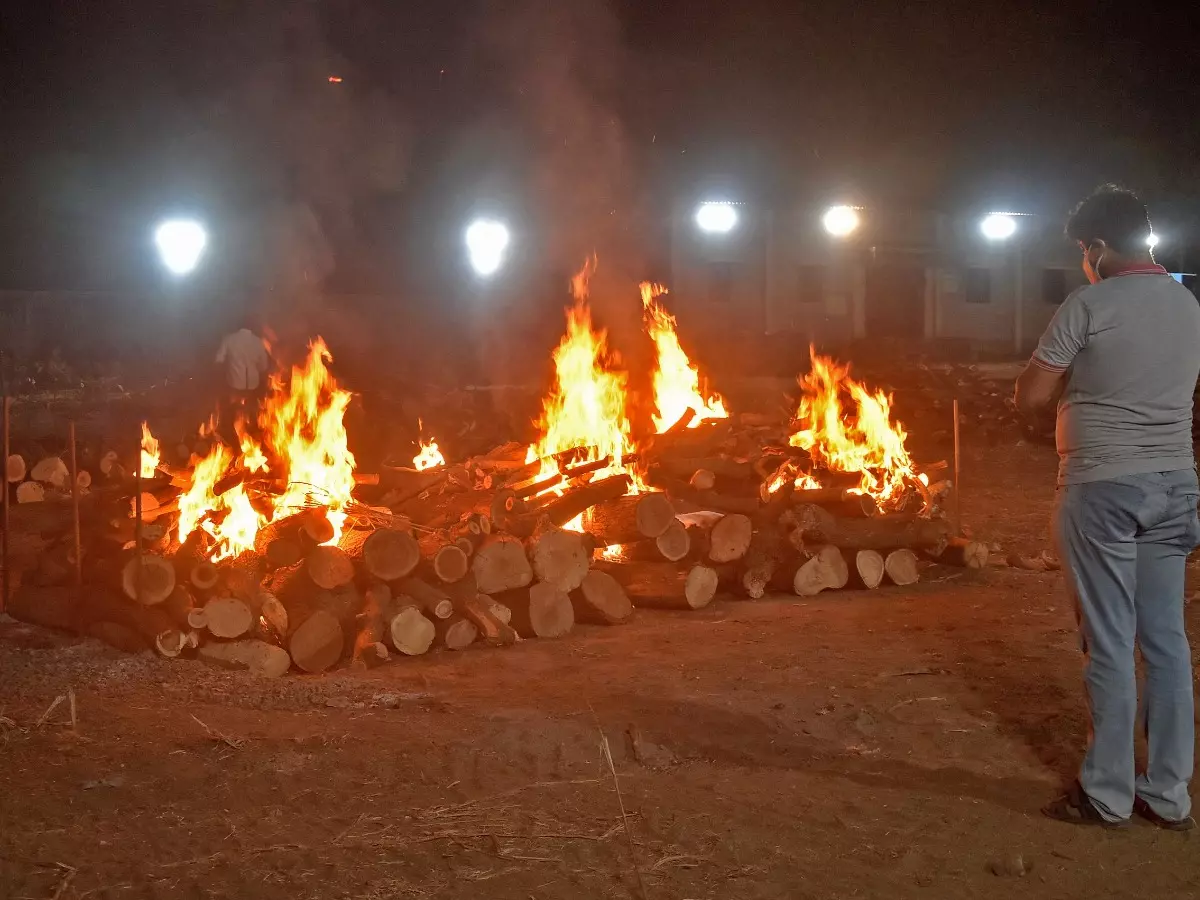Queues Grow Longer Outside Crematoriums In Gujarat As COVID Continues To Claim More Lives
According to reports, crematoriums in Surat, Ahmedabad, Vadodara and Rajkot have been overburdened and grieving relatives have been told to wait for hours to perform the last rites of their loved ones.

During the first wave of COVID-19 in some of the worst-hit countries like the US, Spain, and Italy the world watched in horror how crematoriums were overburdened by the number of bodies of COVID-19 victims being brought there every day.
Now, such unprecedented scenes are being played out in Gujarat, for the past few days where the second wave of COVID-19 is wreaking havoc.
Covid Situation is scary in Ahamedabad , Gujarat. Only supoer Rich can manage to get Hospital admission. The rest have no option but to Self isolate at home. The cremetoriums are crowded and cremation extending through the night. pic.twitter.com/IR2BIERIQM
¡ª Supari Journalist (@sonykalloor) April 13, 2021
Several videos and images posted on social media showed ambulances lined up outside crematoriums and bodies piled up waiting for their turn to be cremated.
A family in Nagarwada had to take the body of a relative in a hand cart for the cremation as they didn't get any ambulance.@RJNews_Ncr @RashtriyaJudge1 @CMOGuj@vijayrupanibjp#Vadodara #Gujarat #COVID19 pic.twitter.com/NxX1oIdYNt
¡ª ??????? ?????????? ?? (@nationalDivyang) April 8, 2021
According to reports, crematoriums in Surat, Ahmedabad, Vadodara and Rajkot have been overburdened and grieving relatives have been told to wait for hours to perform the last rites of their loved ones.
???????? ??????? ????? ? ????? ??. ??????????? ???? ???????? ?????????????? ????. pic.twitter.com/of4UCQnuJR
¡ª Dilip Patel Journalist (@dmpatel1961) April 12, 2021
On Tuesday, it was reported that metal structures of furnaces at some crematoriums in Surat have started melting or breaking as they are being used round-the-clock due to the rush of bodies.
Metal furnaces breaking
Since the past one week, around 16 gas-based furnaces at the Kurukshetra Crematorium and Ashvini Kumar Crematorium in Surat are operating 24X7 to cremate bodies, hence maintenance issues are cropping up, they said.
The metal frames of gas furnaces, on which the bodies are kept, and chimneys are melting or breaking because of overheating and excessive use, the official said.
"Before the coronavirus outbreak last year, around 20 bodies were cremated at the Kurukhsetra Crematorium every day. Now, there is a sudden rush of bodies. At present, we are handling about 100 bodies per day," Kamlesh Sailor, president of a trust which manages the crematorium, told PTI.
 AFP
AFP
Grim readings
Sailor said six gas furnaces at their facility are now being operated 24 hours and hence, the temperature there reaches up to 600 degrees Celsius.
As a result, the iron frames and chimneys have started melting and breaking due to the heat, he said, adding that mechanics are being called to replace those parts.
The Ashvini Kumar Crematorium, the oldest such facility in Surat, is also facing similar issues and its management has decided to increase the number of traditional wood pyres to manage the rush of bodies in case of maintenance issues in the gas furnaces.
 BCCL
BCCL
"We operate 10 gas furnaces and three wood pyres. Earlier, we used to cremate about 30 bodies every day. Now, the number has gone up to 90-95," the crematorium's manager, Prashant Kabrawala, said.
Since the furnaces are being operated round-the-clock, some of their iron frames have melted due to overheating. Some pipes and chimney joints have also broken because of the excessive heat generated in the facility.
 BCCL
BCCL
Earlier this week, as the existing facilities were being overwhelmed the civic administration in Surat had reopened a crematorium that was closed for the last 15 years.
As bodies pile up at crematoriums there are also allegations of a cover-up by the government about the actual COVID-19 death toll.
Though Gujarat has been reporting around 50 COIVD deaths on average for the past few days, the number of bodies that are being brought to crematoriums is much higher.
